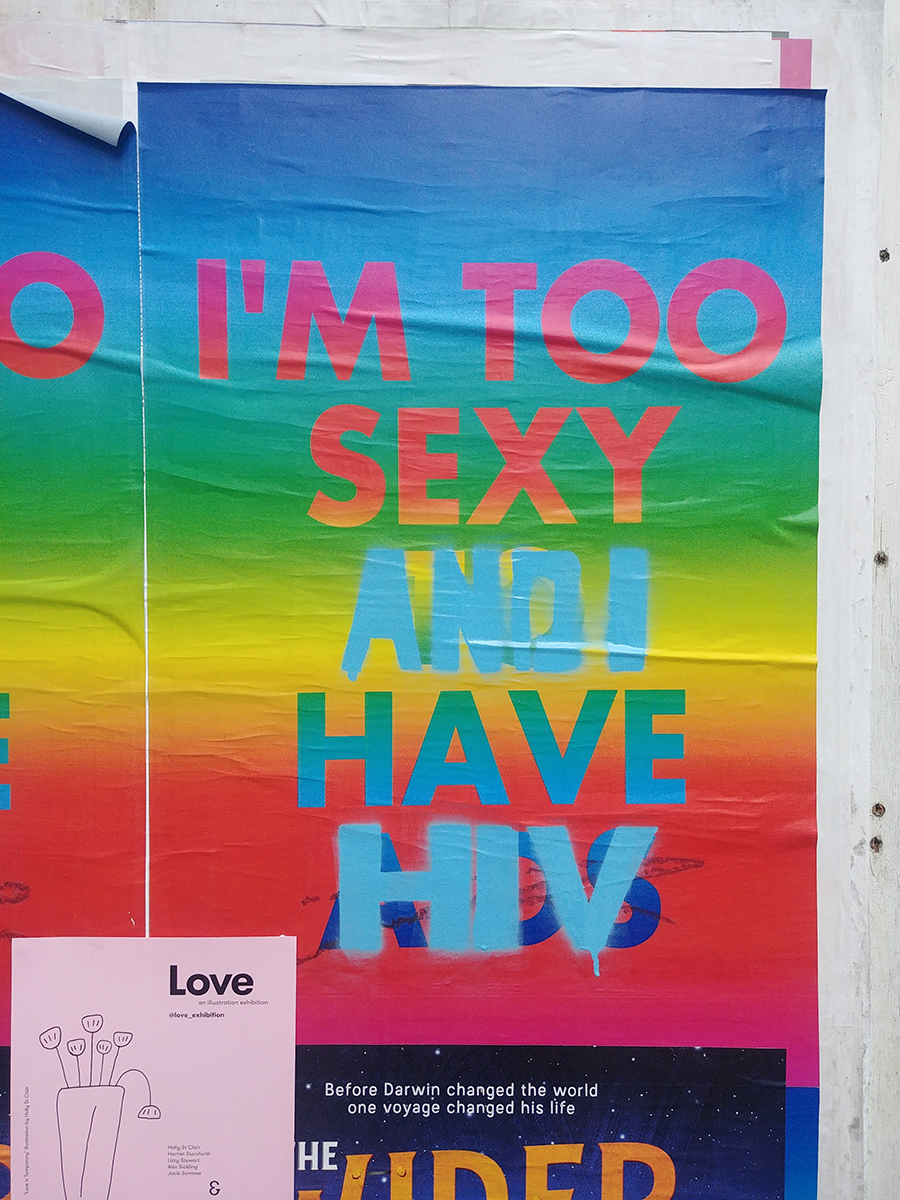Activists’s Subversion of ‘I’m Too Sexy To Have AIDS’ Slogan Does Queer History a Disservice
Why ACT UP activists spray-painting over artist David McDiarmid’s ‘Rainbow Aphorisms’ posters scored an own goal
Why ACT UP activists spray-painting over artist David McDiarmid’s ‘Rainbow Aphorisms’ posters scored an own goal

On Sunday 6 October members of ACT UP London, activists fighting the HIV pandemic, spray-painted over a series of posters by the late artist and HIV-AIDS activist David McDiarmid. Art space Studio Voltaire had been celebrating his work by posting his colourful ‘Rainbow Aphorisms’ (1993–95) slogans across South London. But the activists took exception to one which read: ‘I’M TOO SEXY TO HAVE AIDS’. They painted over the message, so it read instead: ‘I’M TOO SEXY AND I HAVE HIV’.
In an online statement, ACT UP member Dani Singer argued that medical progress since the posters were first made meant that they now contained ‘misinformation’. Singer said that ‘the thought of a newly diagnosed person stepping onto the streets of Soho and coming face to face with this messaging’ was ‘deeply distressing’. Few people diagnosed today with HIV will go on to develop AIDS, and to imply that they would, without proper contextual information, would in the group’s view unnecessarily stigmatize an already discriminated against group. In their opinion, the correction preserved the humour of McDiarmid’s work, whilst making it more ‘relevant’ for today.

But while the need for accuracy and sensitivity in the fight against the pandemic is understandable, the action has not been universally supported. Many LGBTQ artists have taken to social media to describe this as an ‘own goal’. It’s difficult not to agree. Was it really necessary to defend people living with HIV by correcting the words and muting the voice of an artist involved in the same struggle, who himself died of AIDS related illnesses? To speak for an artist who can’t defend himself, or to revise the history of an already underrepresented group, seems more than a little self-defeating.
It didn’t have to be this way. If the activists needed a model for how to do things differently, they need only have looked to the past actions of ACT UP, or to two current exhibitions in London: Gran Fury at AutoItalia and General Idea at Maureen Paley. When the Furies – an artist group affiliated with ACT UP New York – took exception to General Idea’s public art project Imagevirus (1987–ongoing) they didn’t deface them. The work had, with dark humour, taken Robert Indiana’s colourful 1960s ‘LOVE’ logo and turned it into the word AIDS. Objecting to General Idea’s cool irony in the face of a social and political crisis, Gran Fury produced a parody of their own, this time replacing the word ‘LOVE’ with ‘RIOT’ (1989), which they posted on streets and billboards across New York. It was by allowing the two works to exist side by side that the Furies generated awareness and debate on the roles of artists and activists in the crisis.

For Gran Fury it was important not to be complicit in limiting or censoring the already excluded voices of people living with HIV. My correspondence with the group has confirmed that they never altered or removed the work of other artists. The group knew only too well how such work could be obscured: when they did use graffiti, it was to show how homophobes, not other activists, had corrected or defaced their posters. Gran Fury also built alliances with art institutions, using their money and clout to claim public advertising space to further their message. In contrast, ACT UP London did not contact either Studio Voltaire or the estate of the artist David McDiarmid to discuss how the images might have been contextualized or how the two bodies might work together. When asked why this wasn’t done, or why they didn’t use another approach that would have left the original work intact, the group cited the need for swift and direct action. Studio Voltaire have magnanimously expressed sympathy with the action and support for ACT UP London.
But the actions of ACT UP London, and the reasoning behind them, raise significant questions over how the history of HIV-AIDS activism is told and who decides how we tell it. In ACT UP’s statement, filmmaker Siobhan Fahey writes that she is sure that ‘David McDiarmid would approve’ of their more affirmative change to the posters. Even putting aside for one moment the dubious ethics of assuming one can speak for a deceased artist, or indeed a community, Fahey’s statement is hard to believe. The artist wrote of the ‘Rainbow Aphorisms’ that he didn’t want to present just a positive message, but to capture the complex, mixed feelings of living through the HIV-AIDS crisis: ‘I didn’t think it was simply a matter of gay is good’.

It’s also by no means certain that he would have approved of posthumously altering an artist’s work. McDiarmid was actively involved in preserving the estates of artists who had died in the pandemic, aware that many did not have heirs and that their work was vulnerable to disappearance or misappropriation. In appointing themselves to speak for an artist who can’t speak for himself, and deciding what can and can’t be said, with the best of intentions ACT UP London members risk misrepresenting the work and the often complicated, not always comfortable, history of the crisis. As the artist and former Auto Italia co-director Richard John Jones pointed out to me, in a telling irony, at the same time as undertaking this action, the group are actively campaigning against the erasure of Freddie Mercury’s homosexuality from the forthcoming film Bohemian Rhapsody (2018). Defending queer history means also finding a way to acknowledge and deal with the bits of it you don’t like.
By giving themselves the right to decide what is and isn’t ‘relevant’ or what can and can’t be said, the group’s actions also smack of the ‘moralism’ former ACT UP member Douglas Crimp identified in HIV-AIDS activism. From the early 1990s onwards, there was a tendency to push an image of those living with HIV as healthy, responsible, model citizens. But this became complicit in implying that those claimed by AIDS in an earlier phase of the pandemic were somehow bad, overly promiscuous and sick. McDiarmid’s aphorism ‘I’M TOO SEXY TO HAVE AIDS’ mockingly reminds us of a cruel time when desire was distinguished from disease. ACT UP London’s new message is that HIV is something people now live with, and that they can be just as sexy as anyone else. But to fight stigma by seeking to disassociate HIV from AIDS risks implying that the latter is something bad, belonging to a shameful past. While the new message might comfort some in the present, what does the erasure of AIDS from the poster say to those who lost loved ones, or remember a time before medical treatment became available? Surely the task is to remember where we were, whilst also drawing attention to the gains we have made.
Main image: David McDiarmid, Rainbow Aphorisms, 1993–95, installation view, Soho, London, 2018. Courtesy: the Estate of David McDiarmid, Sydney; photograph: Benedict Johnson





















